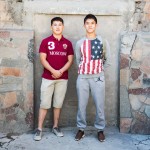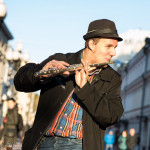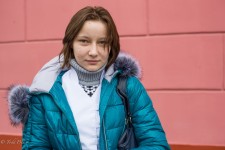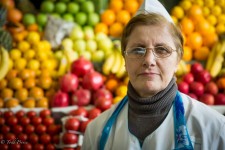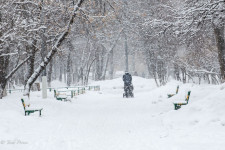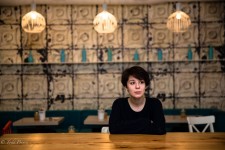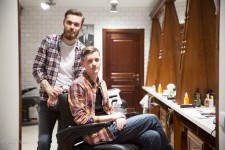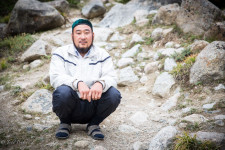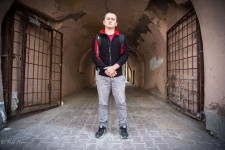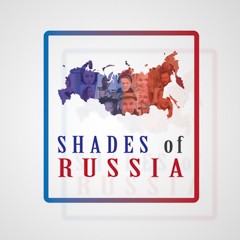Irina: Northern Village Girl
KARGOPOL, NORTHERN RUSSIA: "First I wanted to study medicine, but then changed my mind as I am afraid of all that (injuries, blood)," said Irina, 16, in the center in the M&M-print with her classmates beside her. She was walking with her friends through the town in the late afternoon after classes. Born in a village in Northern Russia, she moved to a town (pop. 10,000) to study at a college with plans to become a teacher. She lives with her older sister and hopes to move further north to the city of Severodvinsk, military town on the White Sea. "There is no work in the village. I need to get into this world."
Nazira: Mother, Business Owner
TASH RABAT: Nazira, 32, grew up around foreign tourists in a mountainous area of Kyrgyzstan near the Chinese border. She helped her parents during the summers to service the foreigners staying in the family's yurts to visit the nearby 15th century Caravanserai. Nazira later went to university to study languages, but one summer between semesters, she met a shepherd who was grazing his livestock in the area. She fell in love and left university. ''I like romantic men, but he isn't very romantic. He just works all the time,'' said Nazira with a laugh in a kitchen inside a train wagon. Nazira, who speaks good English, said she would like to learn Spanish, but doesn't have the time at the moment between taking care of her children and the tourists. Her family is building a new home in the nearby town, which she hopes to turn into a B&B for travelers during the offseason.
Jyrgalbek: Tourism Business, Shepherd
TASH RABAT, KYRGYZSTAN: When the Soviet Union collapsed, a collective farm near the Kyrgyz border with China was carved up. Some workers got goats, others yaks. Jyrgalbek's father received a home attached to the collective farm in the carve up. It would probably have been worth nothing were it not for the fact it lay some 200 meters from a 15th century caravanserai. With borders opened after the Soviet collapse, foreigners started to come visit the Caravanserai and pitch tents to sleep overnight. The family noticed this and considered the potential to make money from tourism. Jyrgalbek, a mechanic who lost his town job after the Soviet collapse, took over the house in the mountains, moving his family there. At first, he started by cooking food for the foreigners while attending to the livestock he owned in the area. Around 1997, he started to set up some yurts for the tourists to sleep in. Nearly 20 years later, he and his daughter have about 20 yurts, which helps generate a good portion of their yearly earnings. The rest comes from selling livestock, such as horses, yaks and sheep at the Sunday market.
Kyrgyz Village School Girl
ISSYK-KUL, KYRGYZSTAN: She was temporarily living in a yurt for the summer with her two brothers, mother and father, who happens to be an eagle hunter. Their new house was still being built. She said she wanted to follow in the footsteps of her mother and become a clothing designer.
Kyrgyz Family, Soros Beneficiaries
BISHKEK SUBURB: This family of seven were selling strawberries on the side of the road outside Bishkek. They picked the strawberries themselves on their small plot. They were selling the buckets of strawberries - a few kilograms - for about $3 each. My driver bought four buckets. When she found out I was from New York, the mother said ''I have friends in the US.'' I inquired and she said that when she was a high school student, they had English teachers funded by the Soros Foundation. She could still remember a bit of English and spoke a bit to me. She said one of her sons is a good boxer while the other likes to place chess.
Jeans Seller in Siberia
KYRGYZSTAN COUNTRYSIDE: This 26-year old said he worked about seven years in Novosibirsk, Russia selling jeans made in China. He said he has relatives in Novosibirsk selling the jeans, including his older brother. He said he would travel occasionally to Moscow for work and could make as much as $1,000 a month before the Russian economic slowdown. The young man said he returned home two years ago to marry and sent his younger brother to Novosibirsk to work selling the jeans. He said his younger brother will return home in a year or two - as is custom in Kyrgyzstan - to take care of their parents. When that happens, he will likely go back to Russia to work, he said. Before the Russian crisis, he said he could sometimes make close to $1,000 a month.
Kyrgyz Convenience Store Worker
ISSYK-KUL: We pulled up to a convenience store in a village near Issyk-Kul at around 11am to buy water, but the door was closed. As I returned back to the car, a young boy came running over to open the door. He said he was manning the store for the day and would be working until evening. His parents were probably in the field working, said my driver.
Begimai: English & Chinese Language Student
BISHKEK: ''I really love English because, knowing it, you can learn about so many interesting things. It is a world language,’’ said Begimai, 18, who was walking in the center of Bishkek holding English language textbooks. One of three children, Begimai said she wants to be an English translator, but does’t plan to limit herself to just one foreign language. ‘’I became interested in Chinese language this year because I understood that a person can learn 2, 3 or 4 languages at the same time if there is a desire. If you have a goal, you can reach it.’’ Begimai said she went to China 9 years ago to visit her aunt, a translator. She said her aunt returned to Kyrgyzstan, got married and know lives in a village. ‘’She said you can forget a language if you don’t practice it.’'
Anastasia: Legal Student Turned Goods Maker
BISHKEK: ''I graduated with a law degree. I thought that it would be useful, but then I got bored and regretted studying it. I am a creative person,’’ said Anastasia, who produces handmade goods in her free time with her friend. Anastasia and her friend were selling their knitted goods alongside a few other artists in front of a Bishkek store dedicated to such handmade items. She said she works in a pharmaceutical company while her friend teaches Korean. ‘’We were looking in the Internet and saw that there are many people making such goods, but there are practically none here in Kyrgyzstan [except those making felt goods]. We wanted to bring something new to the market. We will continue to do this while we enjoy it.''
Daria & Albina: Headed to Germany
BISHKEK: ''My Belarus grandmother had a hard life. She went through German and Siberian camps’’ before ending up in central Asia, said Daria, 25, a Bishkek native. Her other grandmother - a Volga German - didn’t have it much easier. She was exiled to central Asia during WWII. Their children - Daria’s parents - met through their shared interest in skydiving. Having German roots, Daria now wants to move to Germany. ‘’I don’t feel like Bishkek is my home. I feel I can do more in Germany.’’ In the meantime, she would like to write her grandmother's memoirs. Albina, 21, grew up in a small village in Tajikistan, before getting accepted into the American University in Bishkek. She wants to move to Germany to pursue physics, a passion from her school days. ‘’I had a good physics teacher in high school and my parents were both into math.’'
